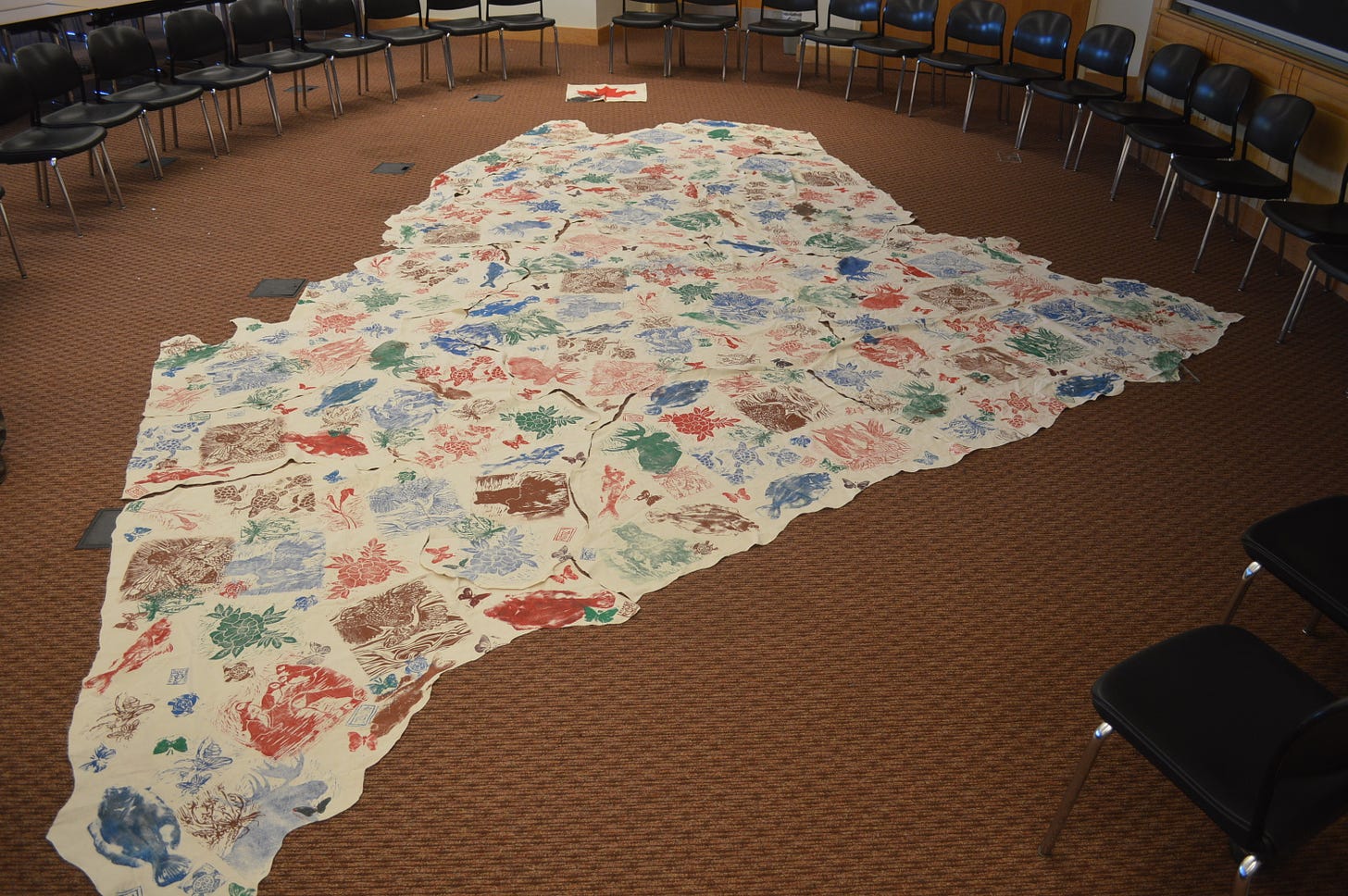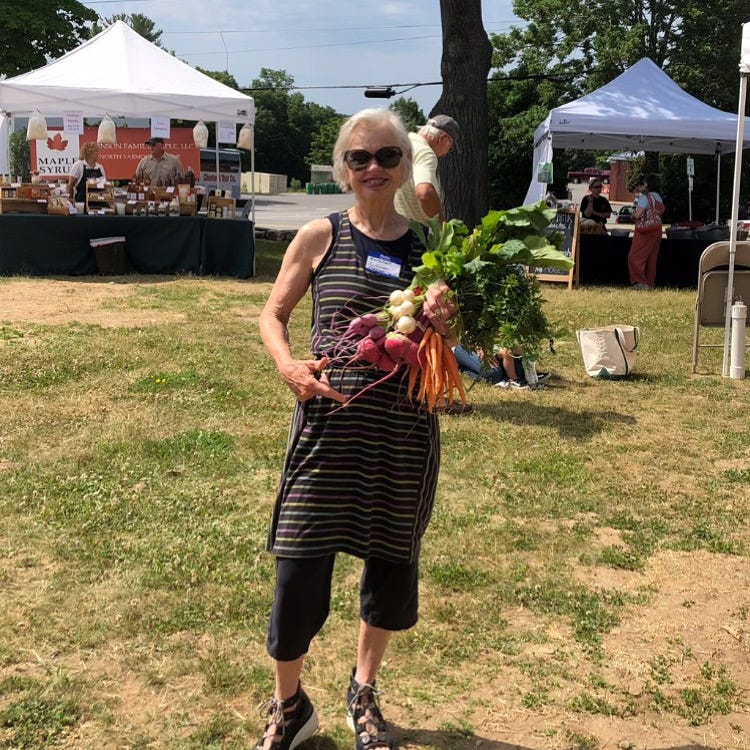“You and your family do not survive the diseases brought here by the arrival of the white man on your shores. Please vacate your place on this map and go and sit down for the remainder of our time here.” Silently, I walk to my chair, one of about thirty that form a large circle in the Bradley room at the Freeport Community Center. It is a late weekday afternoon two weeks ago and we have come together for a different kind of history lesson. Only two or three of the thirty of us who, for a few hours, will relinquish our privilege and identity as white settler and play the role of a Wabanaki tribesperson have drawn the yellow card that makes it our fate to have to leave the place where we are standing on the large map of Maine which is laid out on the floor.
Eric Smith, the Director of the Freeport Historical Society, has taken on the role of omniscient narrator in this story which will unfold in the next two hours. As I, with my new double identity as white settler woman and Wabanaki woman, walk to my chair, I am surprised to notice how shaken and lonely I feel. And how helpless. I have been told to leave. And I have no recourse.
At the end of our time together, there will be very few people standing on that map for they will all have died, their deaths the result of very conscious decisions made to ensure ownership of land, land which I, the privileged one, now live on and call “mine.” Broken treaties, war, starvation from loss of access to land for hunting and fishing and agriculture, scalping bounties, deliberate gifts of smallpox infested blankets, forcible removal of Native American children from parents and home and identity will remove most of the participants from the map. And over and over we will see that those actions were done in the name of Christianity, with the blessing of the white man’s gods.
And we will see that this deadly disposition is not confined to the distant past. It was as recently as the 1960’s that State social workers made surprise visits to Native American homes to forcibly remove the children from their homes. The 1980 Settlement Act, still in effect in Maine and vigorously supported by both Governor Mills and Senator King, prohibits today’s tribal members from receiving the same kind of Federal opportunities and protections afforded tribes in every other state in the country. A recent Harvard study of the effect of this legislation on the tribes concluded that it keeps the Wabanaki peoples in a state of poverty, takes their lives at much earlier ages and reinforces a tragic lack of agency over their existence.
I am in awe of the resilience of the handful of Wabanaki men and women left standing on the map at the end of the two hours and deeply admire their willingness to find a joint way forward with their oppressors. I am in awe at the brilliance of this program facilitated by a woman who herself is a tribal member, who lives in our community, sends her children to the Freeport schools. If it were I sitting among my oppressors, I would be spitting at them, but this woman leads the group with compassion, wisdom, kindness.
The settlers, the treaty breakers, the churchmen who collected scalps, the fishermen who blocked the rivers, the nuns who ran the residential school, the lawyers and councilmen who decreed the land belonged to the discoverers, the social workers who removed the children screaming from their homes—all of these people saw themselves as good people. It has taken our white culture four hundred years to begin to acknowledge the genocide, the greed, the harm we are capable of.
It wasn’t until two weeks ago that the Catholic Church formally denounced the Doctrine of Discovery, a doctrine based on Papal decrees from the 1400’s awarding ownership of all lands “discovered” by white Europeans to the Europeans and not the indigenous peoples who had lived on that land for millenniums.
The Doctrine’s “ ideology supported the dehumanization of those living on the land and their dispossession, murder, and forced assimilation and fueled white supremacy insofar as white European settlers claimed they were instruments of divine design and possessed cultural superiority.”
What I find most chilling, what smacks my brain into little sad and frightened pieces, is the realization from this Wabanaki Reach experience of how easy it is for a mind, any mind, mine, yours, to operate in a state of moral innocence even while making choices to murder, steal, plunder. I had once thought of this kind of dissociative state as a kind of mental illness related to traumatic experiences. Now I see it as an ordinary mechanism of brain function, fueled by greed and narcissism. It’s terrifying to think how normal this dissociation is, how much it is part of our worldview, our very eyes. My very eyes.
What is it I do not see?
One answer to this question lies outside my window. The extinction of species is happening at such an alarming rate that hemlocks and frogs and moose are, like the Native Americans, being wiped off the map that is Maine. If I see my choices and my lifestyle as separate from the deaths of those species, as it has been so easy for me to do, then I too am living in a dissociative state. And if I allow my imagination to take me from this place in the woods to the parched landscape of many places in Africa, I must acknowledge how my lifestyle dries up rivers and cropland and forces millions of people in Ethiopia, Somalia, Kenya, once more, to flee their homeland or die.
Even the night sky is complicit.
Just yesterday my friend L. wrote to ask if I would tell all of you about International Dark Sky Week which begins today. The intent of the week is to encourage awareness around the harm to birds, insects, plants, mammals caused by artificial light in the night sky and to urge individuals and towns and cities to go dark for a week. “Sure, I’ll tell them,” I assure her. Then I look it up. “Birds and sea turtles are guided by moonlight during migration but because of light pollution, they get confused, loose their way and often die.” Oh. More harm. I had no idea. Can I ever see a brightly lit city the same way again? Should FreeportCAN add downtown’s brightly lit winter streets to our list of harms to address? LLBean, champion of Be an Outsider, lights its campus so brightly that the glow of Freeport’s night sky can be seen from miles away.
The climate movement rightly focuses on saving energy and moving from fossil fuels to renewables, but I believe in some ways some of us who are part of the movement remain blind to something much deeper and more essential: which is the way in which we are dissociated from the larger question of how our lifestyle harms the ecosystems we are part of and is directly linked to the climate immigrants arriving daily at our borders. Isn’t it okay to mow acres of green lawn, not one dandelion hidden in its chemically fed tummy? Afterall, I’ve got an electric car and I put solar on my house and heat pumps in the walls, I’m a GOOD guy!
Bob says this blog sounds too preachy and that my assault on Christianity isn’t fair to Christians who have engaged in the process of taking down the dissociative walls. He’s right on both counts. To the first point, I want to say that today I don’t have it in me not to sound preachy. The Wabanaki Reach experience scared me and I want to walk around and shake everyone and say we don’t have 400 years to examine the question of what harm we are blind to, so pay attention! To the second point, I want to say that this Tuesday I am invited to the South Freeport Congregational Church to begin conversation with Rev. Sean Patrick Coady about how FreeportCAN and the Church can work together to address this earth’s crisis. Whoopee!!
As antidote to my impatience, and my sadness and dismay I am going to go outside and listen and smell and see. Last fall a native plants guru drew up a garden plan for us that supports butterflies and birds and other crawling things whose names I don’t know and which won’t invade the forest or wipe out native species. Now after waiting all winter, we can dig and plant and water and watch life emerge.
For this reason I have decided that it’s time to leave my writing chair for now, to say goodbye to you, dear readers, and ask you to look for me in the fall. When I first began this blog in early 2020, I titled it “Process Notes of a Pandemic.” It was intended to help me find language for an experience none of us had ever had before. When spring came in 2021, my two covid vaccines newly circulating in my body, I was ready to go out into the world and I concluded “Process Notes.” Then, when the fall arrived, I was so startled by a rising sun tinted crimson by the fires out West that I started “Code Red” to process my thoughts and feelings about the danger to life on this planet. But when a load of black dirt was delivered onto the lawn by a big red dump truck last spring, I again suspended the blog.
It seems I am a writer who can only write in the dark. When the light gets long and the fecund smell of the earth lures me outside, I can’t bear to sit in my writing chair and contemplate the as-yet-uncontemplated. Thank you, dear readers, for your companionship all through the dark months. Thank you for the conversation, the support. Your presence brings my voice to life. Without it I would be lost and alone and mired in a stew of unlanguaged feelings and random, unprocessed thoughts.
I want to move and walk and swim and set up a booth at the farmers market and pretend I am a Greek woman selling olives in a market hundreds of years ago.
I will be at the FreeportCAN Farmer’s Market every Thursday this summer. The banner under the tent will read, Freeport Climate Action Now. I will hand out postcards that encourage people to eat more plant-based meals, bike more, buy lightly used clothes, local food, mow less, install heat pumps. Will it be enough? Will It matter? I don’t know the answer to those two questions. In many ways the answers aren’t important. I will sit under that tent for 13 weeks because it is the right thing to do, because doing the right thing brings joy and connection. And really good carrots.
Till we meet again in the dark!!
May you be happy, healthy and whole. May you have love, warmth and affection. May you be protected from harm, and free from fear. May you be alive, engaged and joyful. May you enjoy inner peace and ease. May that peace expand into the world and throughout the entire universe.







Someone said “Joy is a form of Resistance” and I for one cannot act against climate chaos (or any of the other ills our privilege has created) without making room for a measure of Joy. Bravo to you for clearing a space in which Joy can flow. ❤️
Code Red has been a wonderful part of my Sunday mornings! Thank you for all you’ve given of yourself! May your garden wanderings be as nourishing to you as your writing has been to your readers.